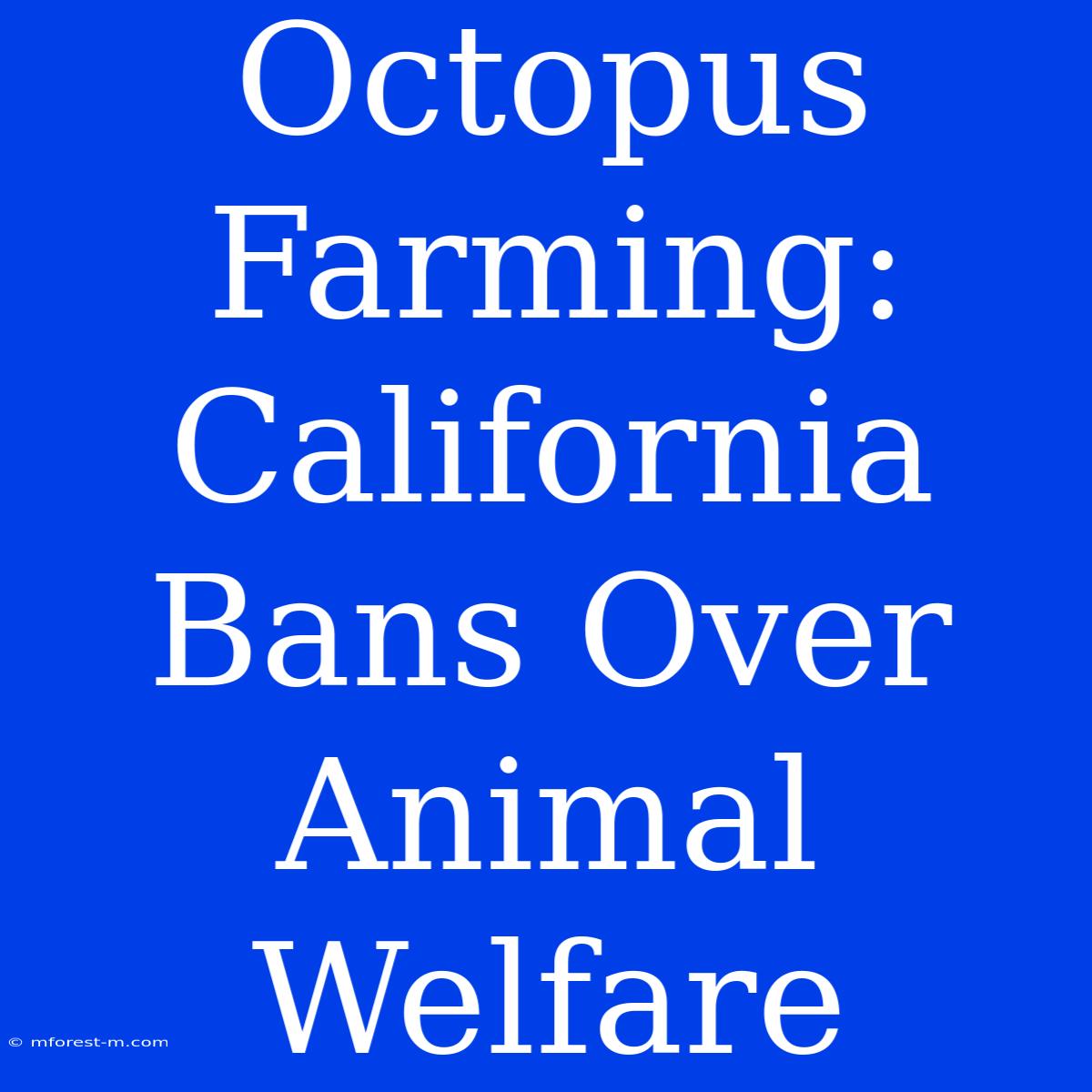Octopus Farming: California Bans Over Animal Welfare Concerns
Is octopus farming ethical? California has banned the practice, citing animal welfare concerns. This groundbreaking decision sends a strong message about the need for responsible practices within the seafood industry. Octopus farming is a growing industry, but it raises serious ethical questions about the well-being of these intelligent creatures.
Editor Note: California's ban on octopus farming marks a significant step towards recognizing cephalopods' sentience and prioritizing their welfare. This move sheds light on the complex issues surrounding the ethical treatment of animals in our food system and underscores the growing need for greater transparency and regulation within the aquaculture industry.
Why is this important? The decision highlights the growing awareness of cephalopods' intelligence and sensitivity to pain, a stark contrast to the traditional view of invertebrates as less complex creatures. It challenges the industry to re-evaluate its practices and prioritize animal welfare, setting a precedent for other regions and countries grappling with similar ethical dilemmas.
Our analysis: We delved into the scientific research on octopus intelligence and the potential cruelty associated with octopus farming, examining the ethical arguments and legal ramifications of California's ban. We also analyzed the industry's perspective on the ban, exploring their arguments for and against the regulation.
Key Takeaways:
| Aspect | Description |
|---|---|
| Octopus Sentience | Growing body of evidence proves octopuses are sentient, capable of complex thought and experiencing pain. |
| Ethical Concerns | Confined spaces, stress, and the inherent difficulty in replicating their natural habitat raise significant ethical concerns about octopus farming. |
| California's Ban | A landmark decision that prioritizes animal welfare, potentially paving the way for similar regulations in other jurisdictions. |
| Industry Impact | The ban challenges the industry to explore alternative seafood sources and adopt more ethical and sustainable practices. |
Octopus Farming
Octopus farming is a relatively new and rapidly growing sector within the aquaculture industry. This industry faces several critical challenges related to the unique biology and intelligence of octopuses.
Key Aspects:
- Intelligence and Sentience: Octopuses are highly intelligent creatures capable of problem-solving, tool use, and even exhibiting signs of emotions.
- Ethical Concerns: Confinement in cramped spaces, stressful conditions, and the lack of access to their natural environment raise severe ethical concerns about octopus farming.
- Environmental Impact: The industry requires vast amounts of water and land, potentially impacting local ecosystems and contributing to pollution.
- Sustainability: The long-term sustainability of octopus farming remains uncertain, considering the complex life cycle and environmental sensitivity of these creatures.
Ethical Implications:
- Sentience: The scientific evidence supporting octopus sentience significantly impacts the ethical considerations surrounding their farming.
- Animal Welfare: Octopus farming poses unique challenges to ensuring the animals' welfare, given their complex needs and the potential for stress in a confined environment.
- Consumer Awareness: The debate over octopus farming has brought increased awareness to the ethical implications of our food choices.
California's Ban: A Turning Point
California's ban is a significant step forward in recognizing the importance of animal welfare in our food systems. This decision raises several critical questions for the future of the aquaculture industry:
- Sustainable Alternatives: Will the ban encourage the development of more ethical and sustainable alternatives to octopus farming?
- Global Impact: Could California's ban serve as a model for other countries seeking to regulate the octopus farming industry?
- Consumer Preferences: Will the ban influence consumer preferences for seafood and contribute to a growing demand for ethical sourcing?
Conclusion:
California's ban on octopus farming is a pivotal moment in the debate over animal welfare and the future of the seafood industry. While the ban focuses on California, its impact will likely be felt globally, prompting reflection on ethical practices and pushing for greater transparency and regulation within the aquaculture industry. This landmark decision underscores the importance of recognizing the intelligence and sensitivity of all animals, even those traditionally viewed as less complex, and underscores the need for responsible practices in our pursuit of food.

